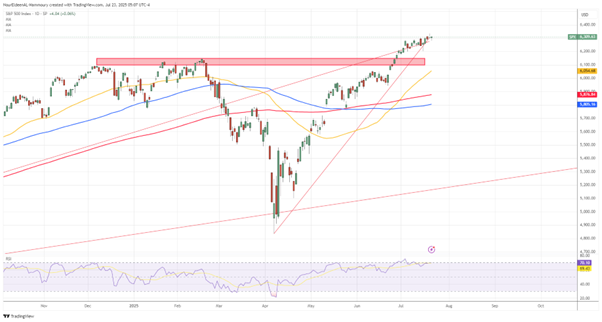Markets surge as US-Japan trade pact restores confidence across asset classes

Global markets are powering ahead midweek, buoyed by renewed optimism following a trade agreement between the United States and Japan. The deal has not only calmed fears of escalating tariff wars but has also injected confidence into equity markets ahead of crucial tech earnings. With headline indices in the US, Europe, and Asia all posting gains, and sector-specific developments adding to the momentum, investor sentiment is clearly risk-on as we approach the end of July.
Equities rally on trade relief and tech anticipation

The S&P 500 futures advanced 0.4%, building on Tuesday’s record close, while Europe’s Stoxx 600 gained 1.2%—led by a strong rebound in automakers amid optimism that the EU could strike a similar deal with the US. In Asia, Japan’s Topix surged by 3.6%, with Toyota shares jumping the most since 1987, reflecting investor relief as the nation avoided a steeper 25% tariff that had been slated for next week.
Markets have recovered sharply from their April slump, as expectations grow that more trade deals could be sealed before the August 1 tariff deadline. Investors are also looking toward upcoming earnings from major US tech firms, with Tesla and Alphabet set to report results later today.
US-Japan trade deal: Key highlights and implications:
President Trump finalized a deal with Japan that imposes a 15% tariff on imports including autos and parts, down from the anticipated 25% rate. This agreement includes several critical concessions and investment commitments:
- $550 billion investment pledge: Japan agreed to create a fund, styled like a sovereign wealth vehicle, with capital directed toward US infrastructure and industrial projects. Up to 90% of profits from these projects would return to the US.
- Automotive standards alignment: Japan will now accept vehicles built to US motor safety standards without additional modifications, easing entry for American car manufacturers.
- Agriculture & defense: Japan will purchase 100 Boeing aircraft, increase rice imports by 75%, and raise annual defense spending on US products from $14B to $17B.
- Energy projects: Tokyo will participate in a long-delayed Alaskan LNG export venture valued at $44B, supporting US energy exports and domestic development.
This breakthrough deal provides clarity to multinational corporations and bolsters sentiment globally, especially in sectors such as autos, defense, and agriculture.
Currency and fixed income market developments

The Japanese yen briefly strengthened following the trade news, before paring gains amid speculation that Prime Minister Ishiba could resign after his party’s election loss. The US Dollar Index was largely flat, while the euro eased 0.2% to $1.1733 and the pound was steady at $1.3540.
In bonds, yields ticked higher across major economies:

- US 10-year yield rose to 4.38%
- German bund yields climbed to 2.63%
- UK gilt yields hit 4.62%
In Japan, 10-year yields reached their highest level since 2008, while demand for a 40-year bond auction was the weakest since 2011.
Commodities and cryptocurrencies

- Brent crude slipped 0.2% to $68.44 per barrel as energy markets processed the implications of trade flows and new investment pledges.
- Spot gold declined 0.2% to $3,426.19 an ounce amid lower demand for safe havens.
- Bitcoin fell 1.2% to $118,356, while Ether dropped 0.8% to $3,676.
Corporate highlights:
- Nokia: Shares declined after the company cut its profit forecast, citing FX headwinds and tariff costs.
- ASM International: Dropped on weak second-quarter orders as semiconductor demand moderated.
- UniCredit: Ended its merger pursuit of Banco BPM, concluding a long-standing standoff.
- Morgan Stanley: Faces regulatory scrutiny regarding anti-money laundering practices in its client onboarding process.
With trade tensions easing and key earnings ahead, markets are at a pivotal moment. The broad relief rally may continue if earnings from big tech confirm resilience and growth. Meanwhile, geopolitical developments, including leadership changes in Japan and potential EU-US tariff negotiations, remain key watchpoints.
As we approach the August 1 tariff deadline, further deals or unilateral measures from the US could shape asset pricing across equities, bonds, and currencies. Market participants should remain alert for volatility and policy-driven catalysts.
Prepared by Nour Hammoury, Chief Market Analyst at SquaredFinancial
Nour is an investor, independent market strategist, and financial advisor. He holds a BA in Finance and Banking Science from Al-Ahliyya Amman University and a CFTe in Economics from the International Federation of Technical Analysts. He has more than 15 years of experience in forex, stocks, and global economic developments, as well as central bank policies and intermarket analysis. He appears regularly on major international TV networks, such as BBC, Al-Jazeera, Al Hurra, CNBC, and Bloomberg, holding open discussions and sharing insights and readings of the markets and trends.
Disclaimer
This is a marketing communication and does not contain, and should not be construed as containing, investment advice or an investment recommendation or, an offer of or solicitation for any transactions in financial instruments. Past performance is not a guarantee of or prediction of future performance. The information contained herein does not constitute a personal recommendation and does not consider your personal investment objectives, investment strategies, financial situation or needs. Squared Financial makes no representation and assumes no liability as to the accuracy or completeness of the information provided, or any loss arising from any investment based on a recommendation, forecast, or other information supplied by Squared Financial.